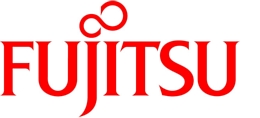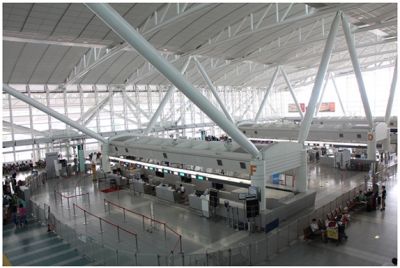|
| Thursday, 10 September 2015, 13:04 JST | |
| |  | |
Source: Fujitsu Ltd | |
|
|
|
|
| Solving issues concerning places where people gather by using the mathematical technologies of the Fujitsu Social Mathematics Joint Research Unit |
KAWASAKI, Japan, Sept 10, 2015 - (JCN Newswire) - The Fujitsu Social Mathematics Joint Research Unit(1) within the Institute of Mathematics for Industry(2) at Kyushu University, Fukuoka Airport Building Co., Ltd., and Fujitsu Laboratories Ltd. today announced the start of field trials at Fukuoka Airport intended to raise passenger satisfaction by applying mathematical technologies to the issues that affect people's state of mind when they face congestion, which lowers comfort and safety.
 | | Kyushu University, Fukuoka Airport, and Fujitsu Commence Field Trials |
In recent years Fukuoka Airport has been witness to an increase in passenger numbers against the backdrop of a sharp rise in foreign visitors to Japan. The airport's international terminal, in particular, has seen a marked increase in activity. As a result, the facilities have become increasingly crowded with longer passenger wait times, leading to an urgent need to design a new policy to prevent passenger discomfort and stress. However, as passenger satisfaction is not only affected by facilities and equipment, but also by airport staff as well as the complicated human factors of the passengers themselves, there was a need to use the trial-and-error method based on actual airport experience to frame an effective policy. Mathematical technologies, such as simulations, are expected to play an important role in improving this situation, but there have been difficulties in implementing them due to various social issues involving human factors. These include issues that need to be resolved between mathematics researchers and on-site decision-makers and the difficulty of reaching a shared understanding of the significance of the use of mathematical technologies.
Now, researchers from Kyushu University's Fujitsu Social Mathematics Joint Research Unit and Fukuoka Airport Building's staff are collaborating on efforts to discover issues on the ground and to resolve Fukuoka Airport's issues. As a first task, they will build a simulation of the congestion that occurs in international procedures facilities, an urgent issue, then carry out detailed on-site data collection, and conduct trials to test policy effectiveness.
Further details of these efforts will be announced by Kyushu University at the 2015 Fall National Conference of Operations Research Society of Japan, to be held starting September 10th at Kyushu Institute of Technology's Tobata campus.
Background
Because of the rise in the number of foreign visitors to Japan, thanks to such factors as the cheap yen, the lowering of visa restrictions for countries in Southeast Asia, and the rise of low-cost carriers, the number of passengers at Fukuoka Airport has been increasing for several years, creating congestion in the airport's procedural facilities and shops. As there is the possibility of a decrease in passenger satisfaction due to this congestion, there was an urgent need to study new policies that take passenger movement and staff operations into consideration.
Issues
Due to the fact that a number of the issues affecting passenger satisfaction involve the psychology of passengers and staff, it has been difficult to assess the effectiveness of policies, and there was a need to use the trial-and-error method based on actual airport experience. While there are expectations that the use of mathematical technologies can help improve the situation, there is a gap between mathematics researchers and the decision-makers on the ground in their understanding of the issues and technologies. Therefore, even if sophisticated technologies were developed, they would not be accepted in the airport. In order for mathematics researchers to make a contribution in the field, they need to cooperate with the relevant people in the airport and develop technology while sharing understanding with each other.
Summary of the Field Trials
1. Purpose
Kyushu University's Social Mathematics Joint Research Unit and Fukuoka Airport Building will carry out joint field work at Fukuoka Airport to clarify the issues that need to be resolved with respect to human psychology, comfort, and safety. Furthermore, they will develop mathematical technologies to implement policies to resolve these issues, as well as test the efficacy of these technologies using real data from the field.
2. Period and Location
Period: September 2015 to August 2017 (planned)
Location: Fukuoka Airport international and domestic terminal buildings
3. Evaluation Outline
Structural Analysis of Issues and Ideal State
Using social science methods, mathematics researchers have had a dialogue with the staff of Fukuoka Airport Building and analyzed the structure of issues and their ideal state for the Fukuoka Airport. In a trial dialogue held before the experiment, words describing the ideal were extracted, such as comfort, safety, security, sales, and liveliness, and the obstacles to realizing this ideal were identified.
Determining Research Topics and Policies
As part of their first efforts, researchers decided to use as their research topic the reduction of congestion during check-in and other departure procedures at the international terminal. Normally, for international flights, passengers must proceed through four procedural steps before boarding: checked luggage inspection, check-in, security inspection, and departure control. If they are made to wait at the first step, checked luggage inspection, they can become very anxious. If they are made to wait for each procedure, passenger satisfaction drops dramatically. There is a need to consider effective policy proposals based on this sort of passenger psychology. Current policy proposals include such things as changing the number of counters and lines, and implementing an in-line screening system that automates checked luggage inspection.
Developing Technology: Mathematical Model Architecture
In accordance with the theme of reducing congestion, researchers will build a mathematical model of the flows of the four procedures as a queueing system. The input data for the model will primarily be of two types, relating to passengers and procedures. Data relating to passengers will include arrival time at the airport, the passenger's airline, and their seating class, among others. Data relating to procedures will include such things as the number of lanes and counters, and the amount of time to serve one person. By inputting this data into the model and carrying out simulations, researchers will have access to such outputs as passenger wait time for each procedure, the wait time caused by each procedure, and passenger satisfaction.
In addition, the research and development of this mathematical model will receive a portion of its funding from the "Deepening of Discrete Mathematical Theories for Optimization of Urban and Social Systems" project, part of the Japan Science and Technology Agency (JST)'s Strategic Basic Research Program PRESTO.
Evaluation of Policy Effectiveness
After collecting input data from the airport, researchers will mathematically analyze the effectiveness of changing the number of counters and lanes, implementing an in-line screening system, and so forth. Based on these results, they will determine polices to be implemented. While the policies are being implemented, they will collect data both to confirm the effectiveness of the policies and to evaluate the strengths and weaknesses of the mathematical model, and use this data to improve the model.
Expected Results
Because using a mathematical model makes it possible to have a numerical understanding of policy effectiveness, it becomes possible to have persuasive policy discussions between many airport-related businesses, including airlines and security companies. Moreover, through this effort, mathematics researchers will begin to understand the methodologies involved in creating mathematical technologies that will take root in real-world situations.
Future Plans
In accordance with the following topics, Kyushu University's Fujitsu Social Mathematics Joint Research Unit and Fujitsu Laboratories will develop and evaluate mathematical technologies based on human psychology and behavior, while Fukuoka Airport Building will implement and evaluate policies aimed at raising passenger satisfaction.
- Policies to reduce procedural congestion at checked luggage inspection, check-in, and so forth
- Security policies that can respond to numerous changing situations within the airport
(1) Fujitsu Social Mathematics Joint Research Unit
A mathematical technology research and development unit aimed at resolving social issues, established in September, 2014, as part of the Institute of Mathematics for Industry by Kyushu University, Fujitsu Limited and Fujitsu Laboratories Ltd.
(2) Institute of Mathematics for Industry
Asia's first mathematics research center focused on industrial technology. In addition to carrying out mathematical theory research for industry, it also contains the Laboratory of Advanced Software in Mathematics, which implements and publishes theories as software.
Contact:
Fujitsu Limited
Public and Investor Relations
Tel: +81-3-3215-5259
URL: www.fujitsu.com/global/news/contacts/
Fujitsu Laboratories Ltd.
ICT Systems Laboratories
Server Technologies Lab
E-mail: Retimer_ISSCC2015@ml.labs.fujitsu.com
Topic: Press release summary
Source: Fujitsu Ltd
Sectors: Enterprise IT, IT Individual
https://www.acnnewswire.com
From the Asia Corporate News Network
Copyright © 2026 ACN Newswire. All rights reserved. A division of Asia Corporate News Network.
|
|
|
|

|
|
|
|